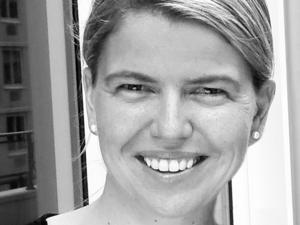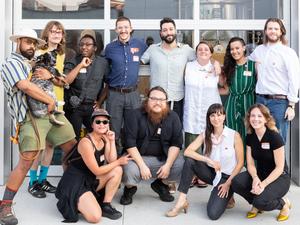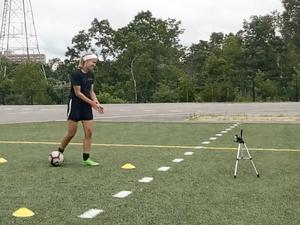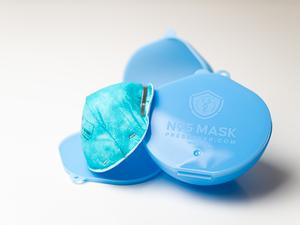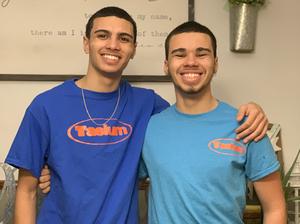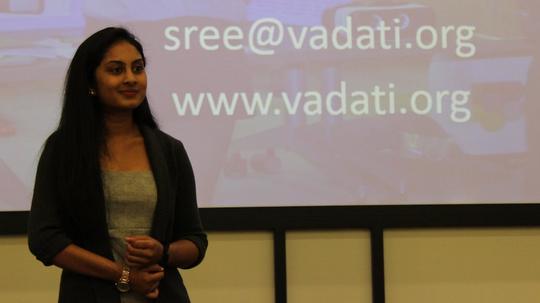
When speaking to Sree Dasari, you're under the impression that you're speaking to a young woman who is incredibly smart, incredibly passionate and incredibly capable of making her ideas a reality.
It's a perception that proves itself true the longer you talk to her, hearing about her journey as a teenage entrepreneur helming her startup, Vadati VR.
Her company uses virtual reality to recreate a public speaking environment, all in an effort to provide an accurate practice space and thus help quell speakers' nervousness. La Salle Academy senior Dasari came up with the idea when recalling how uncomfortable public speaking first made her as a high school freshman, realizing that the majority of her grade in one particular class was predicated on discussion participation in front of a large audience.
"I didn't really know anyone it; was really nerve-wracking," Dasari said. "Raising my hand, I'd start sweating."
Dasari found that the more she practiced speaking in public for other classes throughout her high school career, the more comfortable she became. However, she realized that she could experience greater confidence in the spotlight with a more accurate way of practicing; mirrors and family members, while helpful, don't necessarily prepare one to perform in front of a large audience of strangers.
But how could she replicate that environment? The answer came in an unlikely place: a college tour. The school was using virtual reality (a new concept to Dasari) to help students practice foreign language. Amazed by the possibilities the technology presented, she felt that VR could be the perfect avenue to develop a realistic environment to practice public speaking to the point of relative comfort.
The idea was enticing enough that Dasari decided to move full steam ahead, educating herself in the technology necessary to create her software from scratch. She went to MetroHacks in Cambridge, where she began building the classroom environment she envisioned using frame.Io.
It's "a type of language to code the background," she explained. "That was pretty tough, so I decided to use an actual video recording of a classroom."
That meant a) buying a camera that could film at 360 degrees and b) obtaining footage of a classroom filled with a rapt audience. Once those tasks were completed, she needed to see how truly immersive her mini-film was. If it couldn't successfully dupe a public speaking situation, then she'd have no product.
To figure out how her footage stacked up, she enlisted participants to come speak to her about their favorite animal for around a minute, all while holding a heart rate monitor under the watchful eye of Dasari's video camera. They'd do this twice; once, sans headset and solely performing for Dasari, and the second with a headset, (hopefully) duping the subject into thinking they were standing in front of a class.
"After conducting a lot of trials, I found that virtual reality can [simulate a real public speaking environment]," she said. "Their heart rate was significantly higher; they were speeding [their words]; you could tell they were a bit nervous."
The next step was solidifying what, exactly, Vadati VR's offering would be. Dasari landed on a product that's a mix of both hardware and software components, one that (much like her trials) would help users work against public speaking nervousness by utilizing a heart rate sensor, headset and audio tools as they practice in front of a virtual audience.
During their rehearsal, a connected app would store users' heart rate information and other data, ultimately providing personalized feedback inspired by on the subjects' performance. Think, "Based on your heart rate, you could slow down your words during this part of your speech," etc.
Dasari predicts that the app would have a small fee for one-off users, with schools provided the chance to purchase the tool in bulk. That way, institutions could upload footage of their actual classrooms "where anyone can view it and practice," Dasari said. She also hopes to eventually develop and sell a cost-efficient headset for users.
With the realism of her VR world confirmed and a concept in place, Dasari has thrown herself into developing the requisite technology, writing out a detailed business plan, obtaining a provisional utility patent and written a research paper on the data she's collected.
And that doesn't even scratch the surface of what she's done for creation, all with very little outside direction.
"I registered the company as an LLC in Rhode Island, and right now I'm currently working on funds, developing the website and app and [I'm] reaching out and trying to get more help," Dasari said.
She's also begun sharing her vision in competitions across Rhode Island to much success. Dasari won everything from "Best in Fair" at the 2018 R.I. Science and Engineering Fair to the state's first-ever Lt. Governor Entrepreneurship Challenge in August. She was one of five finalists in the last round, ultimately nabbing the first-place prize of $4,000 in scholarships.
"It was really motivating," Dasari said.
https://youtu.be/xh2vSxVHib4?t=45m30s
If she's not winning pitches, she's spotlighting her work in print and on stage. In fact, Dasari's concept has gotten her featured in GoLocalProv, on Medium as a guest columnist for Girls Who Code, named one of Rhode Island Inno's 25 Under 25 and as a Rhode Island Virtual Reality meeting headliner. These opportunities have allowed her to find and connect with insightful mentors who have used coffee dates to provide wisdom and encouragement as she continues to work on Vadati VR.
The immediate plan is to wrap up app work by January, and has been galvanized not only by her strong showing in competitions, but also in written feedback from potential customers. According to a marketability survey she conducted with nearly 300 students and teachers, 74.1 percent said they would use a tool like hers to help defuse public speaking jitters.
While the future looks bright from the startup perspective, Dasari also has big plans for her own formal education; she's currently on the hunt for the right college to sharpen her already formidable suite of skills.
"I really want to major in computer science and business," she said. It seems like the perfect fit.
